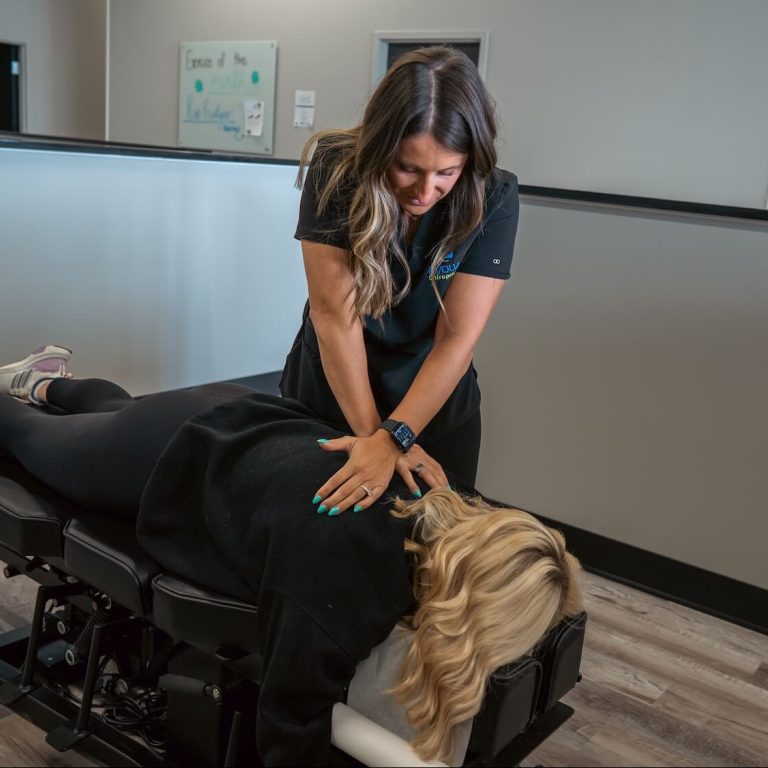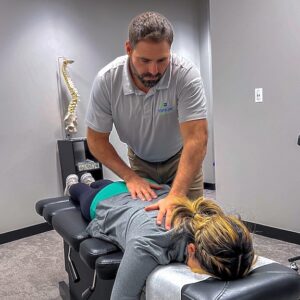Many people considering chiropractic care wonder if a referral is needed see a chiropractor. It’s a fair question, especially for those accustomed to the traditional healthcare model, where appointments with specialists typically follow a visit to a primary care provider.
In truth, a referral is not always necessary. Most states in the U.S. allow individuals to see a chiropractor without a referral from a medical doctor. However, insurance plans and certain clinical scenarios may still influence the referral process. That’s why it’s important to understand how referrals work, how they affect your access to care, and what it means for your overall treatment journey.
At Evolve Chiropractic, our patients often ask:
- Can I start care without seeing my primary care physician first?
- Will my insurance still cover the visit?
- What if I need imaging or other diagnostics?
Here’s the good news:
- Direct access is allowed in all 50 states
- Illinois residents do not need a referral to begin chiropractic care
- Most PPO plans offer coverage without referral
- You can start treatment with us today – no gatekeeping required
Now, let’s take a deeper look at when referrals matter, how insurance plays a role, and why you might choose to get a chiropractic referral even when it’s optional.
Can You See a Chiropractor Without a Referral?
In short – yes. In every U.S. state, chiropractors are considered primary contact providers. That means you can consult them directly for evaluation and chiropractic treatment, without needing pre-approval from a primary care doctor or other healthcare provider.
In Illinois, this autonomy is fully recognized. Chiropractors can assess, diagnose, and manage musculoskeletal conditions independently. This includes performing chiropractic manipulation, adjustments, prescribing exercises, and recommending wellness strategies – all without prior authorization from another provider.
This level of access brings real benefits. Patients can receive care quickly, often scheduling same-week appointments. For conditions like neck pain, lower back pain, or migraines, getting fast, hands-on help can be the key to faster recovery and improved function.
Delaying care can prolong discomfort. With direct access, you can skip waiting lists and get right to the chiropractic care that brings relief.
When Do You Need a Referral?
There are still circumstances where a referral may be required – or at least beneficial.
Some insurance plans, particularly HMOs, have stricter requirements. They may mandate a written referral from your primary care physician to approve and pay for chiropractic services. This is more about policy than legality and typically doesn’t affect your right to access care, just your ability to use insurance for it.
Referrals may also come into play for diagnostic testing. If a chiropractor suspects you may need an MRI, CT scan, or lab work, your insurance plan might request documentation or input from another healthcare provider to authorize those procedures.
In certain complex cases – such as pre-existing conditions or post-surgical recovery – a referral can help coordinate a care plan that includes input from multiple professionals. For example, your chiropractor may work in tandem with your physical therapist or surgeon to guide recovery after spine surgery or joint replacement with massage therapy, physical therapy, or other services.
Insurance Coverage for Chiropractic Services
Your insurance plan can have a big impact on how you access chiropractic services – and how much they cost out of pocket.
Here’s a breakdown of how different plans treat chiropractic visits:
- PPO plans: Most Preferred Provider Organization plans cover chiropractic adjustment, spinal decompression, and spinal manipulation without a referral. You’ll have more flexibility in choosing your provider and scheduling.
- HMO plans: Health Maintenance Organization policies often require a primary care provider referral. Without it, your treatment may not be reimbursed.
- Out-of-network care: If your chiropractor is not in your insurer’s network, you may still be eligible for partial reimbursement, depending on the plan.
- Cash-pay options: Many clinics, including Evolve Chiropractic, offer transparent self-pay pricing. This makes care accessible even if your insurance is restrictive – or if you prefer not to deal with it.
Our team is always available to help verify your benefits before you book an appointment. We believe in making care affordable, simple, and stress-free.
Benefits of Direct Access
Having the ability to schedule your own chiropractic care comes with many advantages:
- Immediate relief: You don’t have to wait for someone else’s approval to address pain that’s disrupting your life.
- Shorter timelines: Direct booking leads to faster evaluation and treatment – especially helpful for acute conditions like neck pain or sports injuries.
- Empowerment: Patients are more likely to follow through when they take an active role in choosing their care path.
- Cost savings: Fewer appointments and less bureaucracy often lead to lower costs overall.
- No primary care delays: With many primary care clinics booked out for weeks, direct access helps you avoid unnecessary delays in care.
Chiropractic clinics like Evolve are equipped to evaluate your condition thoroughly and refer you out if additional care is needed. But most of the time, the journey toward healing begins right here – with us.
When a Referral Might Be Advantageous
Even if it’s not required, a chiropractic referral can still be valuable.
For starters, it may increase your insurance reimbursement. Some plans pay a higher percentage or waive certain fees when care is coordinated through your primary care doctor. That’s especially true for plans with narrower networks.
Referrals also support more integrated care. If you’re managing multiple health issues or recovering from surgery, coordinated treatment makes sense. A referral facilitates shared records, unified plans, and better communication between providers.
Additionally, chiropractors may request a referral if your case requires imaging, blood work, or specialty consultation beyond the scope of conservative care. For example, if we suspect spinal stenosis or inflammatory arthritis, we may work in tandem with a healthcare provider or orthopedic specialist.
Ask your primary care provider if a chiropractic referral is right for you – especially if you have questions about insurance or complex medical history.
Common Patient FAQs
Here are some of the most frequent questions we receive about referrals and chiropractic access:
Do I need to visit my doctor first?
No, not in Illinois. You can contact us directly to begin care.
Will my insurance cover visits if I self-refer?
PPOs typically do. HMOs may not. Our team can check your benefits before your first visit.
Can chiropractors order diagnostic imaging?
Yes. In Illinois, chiropractors can order X-rays, MRIs, and other imaging tests as needed.
What if my condition changes during care?
We’ll refer you to the appropriate provider for additional care or imaging when necessary.
Are there costs without a referral?
Possibly. If your insurance doesn’t reimburse self-referred visits, we offer transparent pricing and affordable payment options.
Take the Next Step Toward Relief
So – do you need a referral to see a chiropractor? In most cases, no. Direct access to care allows patients to take charge of their health, start treatment faster, and avoid unnecessary hurdles.
At Evolve Chiropractic, we believe that pain management shouldn’t dictate your schedule, and referrals shouldn’t delay your recovery. From the moment you walk into our clinic, we focus on delivering compassionate, evidence-based care tailored to your unique needs.
If you’re ready to take the next step toward healing – whether you’re dealing with chronic tension, recent injury, or long-standing dysfunction – we’re here to help.
Schedule your self-referred chiropractic visit now and take the first step toward lasting relief and better movement.





